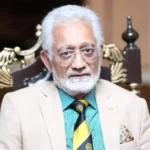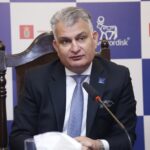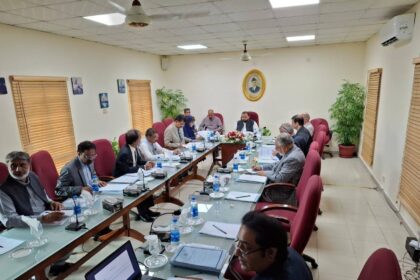Dr. A. H. Aamir Calls for National Policy Shift to Treat Obesity as the Root of Pakistan’s Health Crisis
Nadeem Tanoli
In a powerful address during Novo Nordisk Pakistan’s national dialogue on chronic diseases, Dr. A. H. Aamir, President of the Pakistan Society of Obesity and former President of the Pakistan Endocrine Society, issued an urgent appeal to reframe obesity as the central driver of the country’s non-communicable disease burden. He called on policymakers, medical professionals, and the media to recognize obesity not as a lifestyle flaw but as a medically rooted condition that requires systemic solutions.
Opening his remarks with gratitude to his colleagues and the organizers, Dr. Aamir drew a bold comparison: if even a single case of polio emerged in Islamabad, it would generate national panic and immediate government action. Yet diabetes and obesity, which affect millions and carry long-term, debilitating consequences, continue to be ignored. “The silence around obesity is dangerous,” he warned, calling on the media to treat obesity and diabetes with the same urgency as communicable diseases.
Dr. Aamir traced how medical education and public health focus have shifted over time. Where once syphilis was considered the cornerstone of medical knowledge, diabetes now holds that role. But even diabetes, he said, has been overtaken by obesity as the core issue linking nearly every major disease—from cardiovascular disorders to kidney failure to cancer. He argued that obesity deserves to be treated not merely as part of the broader non-communicable disease category, but as a category of its own, given its cascading impact.
A key focus of his address was Pakistan’s youth. With one of the youngest populations in the world, Pakistan holds immense demographic potential. Yet a significant portion of young adults are already living with obesity, diabetes, or hypertension, especially during their most productive years. This, he warned, is a ticking time bomb for the country’s future. “If we don’t invest in the health of our youth, they won’t be able to contribute to the nation’s growth,” he said.
Dr. Aamir emphasized that the traditional approach of shaming individuals with obesity—telling them to “eat less” or “exercise more”—misses the mark. He explained that obesity is driven by neurochemical and hormonal processes, where pleasure centers in the brain are hijacked by unhealthy foods. “We need to stop blaming and start treating,” he urged. He also acknowledged the role of pharmaceutical innovation, highlighting Novo Nordisk’s development of medications that help regulate hunger and satiety in individuals with obesity.
However, he made it clear that prevention and treatment must go hand in hand. While antenatal care, early education, urban planning, and safe recreational spaces are long-term solutions, he stressed that immediate support is needed for the millions already living with obesity. “We must make them effective citizens again,” he said.
Dr. Aamir presented a compelling economic argument for policy change. He asserted that government health budgets could be significantly reduced by investing in obesity prevention. Costs related to dialysis, heart surgery, and stenting could be minimized if the root causes—obesity and diabetes—are tackled. “Public health is not a cost; it’s an investment,” he explained, urging the state to prioritize long-term savings over short-term neglect.
He closed with a call for implementation, quoting the adage, “Policy is implementation, and implementation is policy.” Dr. Aamir affirmed the readiness of the Pakistan Endocrine Society and Pakistan Society of Obesity to collaborate with the government and private sector in shaping evidence-based strategies. “If you want to go fast, go alone. If you want to go far—and fast—go together,” he said, applauding the spirit of collaboration fostered by Novo Nordisk and its partners.












